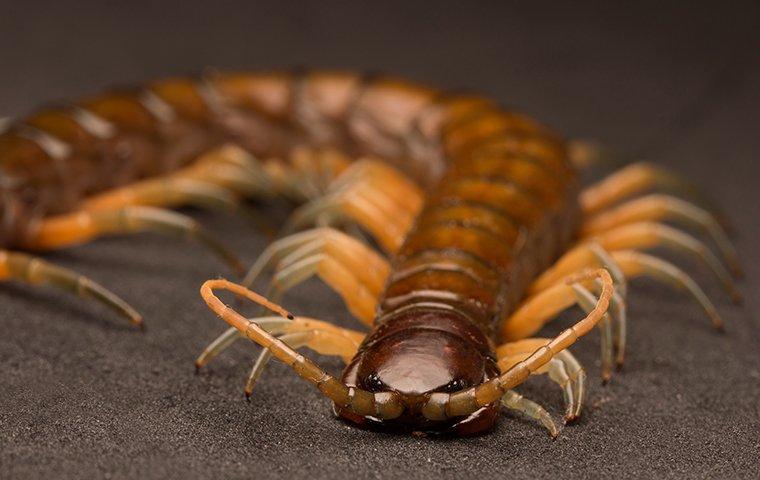

Centipede
What Are Centipedes?
Frightening, unpleasant-looking insects, centipedes, are leggy pests that no one wants to discover lurking in the corners of their homes.
Centipedes are pretty easy for people to identify. They have an elongated, segmented, flattened body and one pair of long skinny legs extending from each body segment. Centipedes are usually a yellowish-gray or brown color and range in size from one-half to six inches in length. Most of the ones we run into are around an inch to an inch and a half.
Other identifying features on a centipede include a long antenna and a first pair of legs that end sharp claws. These predators use their claws to capture their prey and inject venom into their victims to paralyze them.
As predators, centipedes are helpful in the fact that they help to control nuisance insect populations. But, when these arthropods move into our gardens or homes in large numbers, they turn into unwanted pests.
Centipede Frequently Asked Questions (FAQs)

Are Centipedes Dangerous?
Centipedes are not very dangerous pests, but you should take care around them, and it is best not to pick them up. They are capable of delivering painful bites to people as a means of defense. Mainly nuisance pests, the biggest concern with centipedes, is that they are annoying to deal with and difficult to control.
Why Do I Have a Centipede Problem?
Centipedes are attracted to places that provide them with moisture and plenty of insects for them to hunt. If you have a problem with centipedes, it may be a sign of underlying moisture or insect problem around your home.
Soil and landscaping materials (mulch, rocks, and railroad ties) found around the foundation of our homes are attractive to centipedes. When living near our homes, it becomes very easy for them to move inside through vents, cracks in the foundation, or basement doors. Weather that is too hot and dry is most often the reason these leggy pests move indoors.
Where Will I Find Centipedes?
In nature, one of the centipede’s favorite hiding spots is under rotting logs. They also like to hide under rocks, in tall grass, and under piles of leaves or other decaying vegetation.
Places around homes where centipedes hide include areas under dense shrubbery, landscaping ties, woodpiles, fallen trees, leaves, or brush piles.
When centipedes move inside, they move to areas of a home that are damp, dark, and helps them to meet their moisture needs. Common centipede hideouts include:
- Cabinets under sinks
- Crawl spaces
- Basements
- Areas around sump pumps or drains
- Wall voids near plumbing pipes
How Do I Get Rid of Centipedes?
Locally owned and family-operated, All-Safe Pest & Termite is the best choice to get rid of centipedes from your home or business. We offer fast response times and peace of mind knowing that your pest problems will be solved, and they won’t return. Our experienced professionals provide top-quality pest control services using the latest and most effective products to eliminate centipedes from Dallas properties. Discover why your neighbors choose All-Safe Pest & Termite for their pest control needs. Give us a call today!
How Can I Prevent Centipedes in the Future?
Prevent problems with centipedes by partnering with All-Safe Pest & Termite and by implementing the following prevention tips:
- Keep centipedes away from your home by keeping its perimeter dry. Make sure gutters are in good working order, cut overgrown shrubbery back, and leave a barrier between any mulch or soil and your foundation.
- Remove decaying pieces of wood from your property like fallen trees, tree stumps, piles of leaves, brush piles.
- Repair leaky pipes inside or outside of your home.
- Keep your lawn cut shorts and cut back weeds or grass from your foundation.
- Make moving into your home difficult by repairing cracks in the foundation, placing door sweeps on exterior doors, and placing covers on vents leading into your home.
- Inside, keep excess moisture that centipedes love at bay by using dehumidifiers or air conditioners.

Get Your Free Estimate
$50 Off Your Initial Service When You Book Online!

How We Can Help You Our Services





.jpg.2601291047352.webp)
